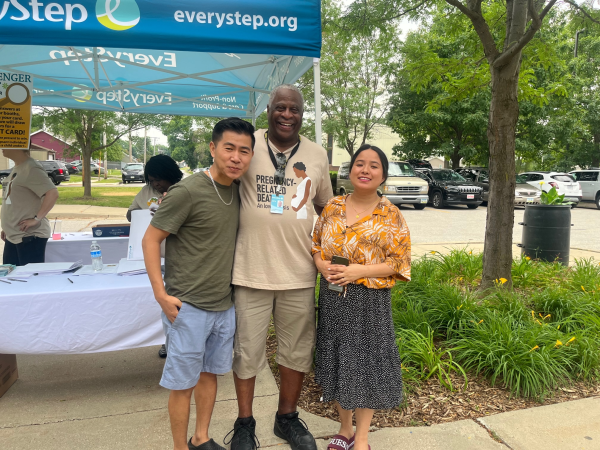April 5, 2024
How EveryStep is Making a Difference in Minority Health

Despite some advances, the burden of premature death and illness still falls disproportionately on people from racial and ethnic minority groups. And this is not a new problem.
Efforts to build awareness of health disparities dates to 1915, with the establishment of National Negro Health Week by Booker T. Washington. In 2002, the U.S. Congress established April as National Minority Health Month.
What drives health disparities?
Health disparities are often the result of social determinants of health — non-medical factors like poverty, limited access to health care and lack of transportation. Jen Groves, EveryStep vice president of community health services, says EveryStep works intentionally to reduce health disparities by targeting those most affected by them. “We have some very specific strategies and educational opportunities for folks that are racially, ethnically and linguistically driven,” says Groves. For instance, EveryStep’s Black and Birthy prenatal class and Doula program were created in response to statistics that show Black women are 4 times more likely than white women to die in pregnancy or childbirth.
EveryStep works to advance minority health
EveryStep’s teams of nurses visit at-risk families in their homes to provide perinatal health care and education. “The people served by EveryStep’s maternal and child health programs are dealing with extreme poverty, pregnancy at a young age, lack of transportation and language barriers,” says EveryStep maternal and child health director Becky Borgman, RN, BSN. “Our nurses are doing more than just health assessments – they are walking alongside these mothers to help them graduate from high school, pay their rent, and learn how to take care of their babies. We encourage their ability to self-advocate and achieve the best version of what they want for their lives."
Learn More
“The people served by EveryStep’s maternal and child health programs are dealing with extreme poverty, pregnancy at a young age, lack of transportation and language barriers.”
Juana, an immigrant from Mexico and now a U.S. citizen, says EveryStep has helped her achieve many of her goals. “EveryStep offered me a lot of services for me and my son, Angel. Through [EveryStep’s] Stork Nest, I received a lot of things that I need, like diapers and a crib.” Juana also credits EveryStep case workers with connecting her to Habitat for Humanity, which provided the home in which she and her family now live.
Noel Lalthangliana, an EveryStep outreach specialist and interpreter serves immigrant and refugee families in EveryStep programs by making home visits, providing interpretation, understanding their challenges and connecting them to community resources. “When I use my skills and abilities to help those in need, I get the blessings and happiness of life. I know that even a small thing could be a great gift for someone who needs it.”
Connect with EveryStep
Your help is needed to make a difference
Everyone faces challenging times in life, but some people in our community are facing more difficult circumstances. EveryStep shows up when people need us most — no matter who they are or what circumstances they face. With a comprehensive slate of health care and human services, EveryStep meets people where they are and helps them build the foundation for a healthier future.
Consider a Monthly Gift
EveryStep’s staff are recognized experts with decades of experience offering high-quality care and support to address complex challenges. You can help those struggling in your community as well. Through EveryStep, your gift demonstrates that you believe in a community where people show up for one another. Please consider making a gift to strengthen Iowa’s care and support network.